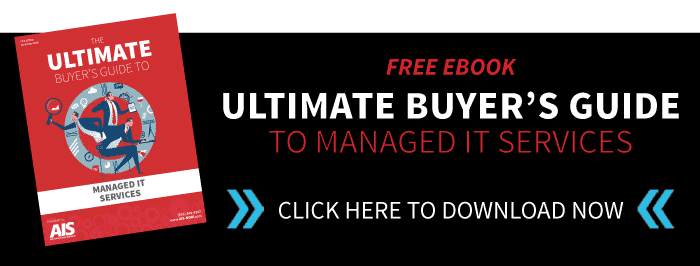Spyware: What Is It And How Can You Prevent It?
September 15th, 2021 | 6 min. read

The relatively brief history of personal computing is filled with advancements in processing power that have enhanced the productivity of businesses across various industries. From email to word processing to the World Wide Web, computer technology has forever transformed how work is done.
But as with any new technology, these advancements have also created new methods that cybercriminals exploit to steal business or personal information and demand ransom. One of those methods is spyware.
In this article, we'll help you understand what spyware is, how it works, and how to prevent it. We will also outline how IT solutions (like ours) can help you combat spyware attacks. Let's dive in.
What Is Spyware?
Spyware is a type of malware designed to enter your computer or mobile device, gather sensitive data about you, and send it to a third party without your consent.
This type of malware can be used to steal sensitive information such as credit card numbers and account passwords, resulting in fraud and identity theft.
How Does Spyware Work?
Spyware is distributed using various methods. One of the most common is getting users to click on a link leading to a malicious website. These links can be in text messages, pop windows in a browser, ads on web pages, and emails. Malicious links have also been known to show up in Google search results.
There are instances when you don't have to click on a malicious link to get your website infected. This is usually done via malvertising—delivering an infected ad to legitimate websites through legitimate ad networks.
On some occasions, threat actors plant malicious codes on legitimate websites that can infect visitors by merely landing on the page.
Another standard method used to distribute spyware is the opening of infected files. Such files are usually attached to email messages disguised as originating from a trusted source like the U.S post office or a bank.
Users can also be enticed to download spyware. A program developer might peddle their program as a valuable addition to a software library, yet it contains spyware in the real sense.
There are instances when deleting the program from your computer may eliminate the application. However, the spyware may remain behind and continue spying on you.
Mobile phones can also become spyware targets. While it's irrefutable that Apple and Google are doing a great job of catching malicious applications distributed via their online store, they are not 100 percent foolproof.
Types Of Spyware
Spyware can take various forms, including:
- Adware: This type of spyware eyes your online activities and displays ads it thinks you might be interested in based on that information. Even though it is benign compared to other types of spyware, Adware can affect the performance of a device.
- Trojans: Upon landing on a device, Trojans look for sensitive data such as bank account information and forward it to a third party who will use it to compromise accounts, steal money or make fraudulent purchases.
- Tracking cookies: These follow your online activity as you browse, compile your browsing history, and record login attempts. With the right tools and knowledge, a hacker can use these cookies to recreate your log-in sessions.
- Keyloggers: This enables cybercriminals to capture every keystroke from your keyboard, including those you use when logging into your online accounts.
- Stealware: This spyware is designed to take advantage of online shopping sites awarding credit to websites that send users to their product pages. When a user visits one of those sites, stealware intercepts the request and takes credit for sending the user to that site.
- Stalkerware: This is installed on a mobile device so that a third party can track the owner. For instance, during the trial of Mexican drug kingpin Joaquin "El Chapo" Guzman, it was revealed that he installed spyware on the phones of his associates and wife so that he could keep tabs on their movement, listen to their conversations, and read their text messages.
How To Tell If You Have Spyware
As we've established above, spyware is crafted to be untraceable and undetectable. As such, telling whether you have it can be difficult. To determine whether it has infected your mobile device or computer system, you need to keep an eye out for the following warning signs:
- Your device crashing or freezing frequently
- Your device running slower than usual
- Your browser's homepage changing unexpectedly
- Web search redirecting you to a different search engine
- New or unidentifiable icons appearing in the taskbar
- You start getting numerous pop-ups
- You start receiving random error messages when using apps that have never had issues before
Of course, these symptoms are also those of other malware infections.
How To Prevent Ransomware Attacks
Whereas there isn't a surefire way of stopping spyware itself, you can prevent it from infiltrating your devices. Below is an outline of some of the ways of doing this:
- Avoid installing free software from questionable sources: Some online sources offer free software to help you perform various tasks. Beware that most of these free options are bundled with spyware. You are better off buying a tool known to be from a reputable source than taking a chance with the alternative since it may expose your information to cyber security threats.
- Use anti-malware software: You should always ensure that your computer is protected by antivirus or anti-malware. Even though you can use third-party tools, you should prioritize using security software built into Windows.
- Ensure that your mobile device and computer are updated: Ensure that your phone and computer are updated with the latest software and security updates.
- Don't click on anything you don't trust: Heed to the tried and true advice of never clicking on anything you don't fully trust—this goes for attachments and links from an unknown sender.
- Be wary of pop-up ads, especially those shouting about awards: Never respond to pop-up ads in any way, even if they display the "Close" or "Cancel" button. You can also turn on the pop-up blocker.
- Avoid chatting with strangers in messaging apps: Doing this will ensure that you don't accidentally click on a malicious text message.
- Build a human firewall by educating your employees on the best cybersecurity practices: Educating your employees on best cybersecurity practices will go a long way in ensuring that you don't become a victim of malware attacks such as spyware.
The Final Say On Spyware
Spyware threats pose significant threats to both individuals and businesses. Understanding what it is and how it works is crucial in preventing it from infecting your system and wreaking havoc on your business.
We hope this article answered your questions and gave you some tools that will help keep your business safe. At AIS, we’re an office technology who cares about the growth and success of your employees and organization. To learn more about best safety practices, make sure to contact us today. We’re here to give you peace of mind to help you win more business.
A true southerner from Atlanta, Georgia, Marissa has always had a strong passion for writing and storytelling. She moved out west in 2018 where she became an expert on all things business technology-related as the Content Producer at AIS. Coupled with her knowledge of SEO best practices, she's been integral in catapulting AIS to the digital forefront of the industry. In her free time, she enjoys sipping wine and hanging out with her rescue-dog, WIllow. Basically, she loves wine and dogs, but not whiny dogs.
Topics:



